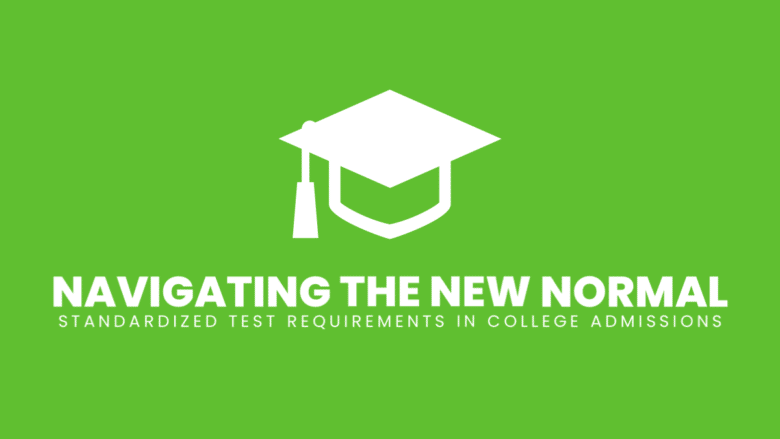Navigating the New Normal: Standardized Test Requirements in College Admissions
As colleges and universities navigate the post-pandemic educational landscape, the debate over standardized testing requirements has gained new momentum. Institutions across the United States are reevaluating their admission policies, especially the role of SAT and ACT scores, leading to a shifting paradigm that impacts prospective students and their families. In this post we share the current state of standardized test requirements so our students can make informed decisions about their test preparation path.
The Shifting Sands of Admission Policies
The onset of the COVID-19 pandemic led to widespread disruptions in the educational sector, including the cancellation of standardized tests worldwide. In response, many colleges and universities temporarily adopted test-optional or test-blind policies to alleviate the stress on applicants. This change sparked a broader conversation about the fairness, accessibility, and relevance of standardized tests in college admissions.
Fast forward to the present, and we find a mixed landscape. Some institutions have extended their test-optional policies or made them permanent, citing a more holistic approach to evaluating applicants. Others, however, have reinstated the requirement for standardized test scores, arguing that these exams provide valuable data points in assessing a student’s readiness for college-level work.
Colleges Requiring Standardized Test Scores? A Snapshot.
As the discussion continues, here is an overview of the testing policies at a handful of well-known colleges and universities:
- Harvard University: Test-Optional through the 2025-2026 admissions cycle.
- Stanford University: Test-Optional for the 2022-2023 academic year, with policies beyond that yet to be confirmed
- Massachusetts Institute of Technology (MIT): Reinstated SAT/ACT testing requirement for the 2022-2023 admissions cycle
- University of California (all campuses): Test-Blind for all California state applicants. Out-of-state applicants can submit scores but they will only be used for purposes such as course placement and certain scholarships
- University of Texas at Austin: Reinstated SAT/ACT testing requirement for the 2024-2025 admissions cycle
- University of Southern California (USC): Test-Optional for the 2023-2024 admissions cycle
- Dartmouth University: Reinstated SAT/ACT testing requirement for the 2023-2024 admissions cycle
- Brown University: Reinstated SAT/ACT testing requirement for the 2024-2025 admissions cycle
- Yale University: Test-Optional for the 2022-2023 and 2023-2024 admissions cycles
- Princeton University: Test-Optional for the 2022-2023 admissions cycle, future policies to be determined
- California Institute of Technology (Caltech): Test-Blind for admissions until the Fall 2025 entering class
- University of Chicago: Test-Optional, has been since 2018, allowing students to decide whether or not to include SAT or ACT scores in their applications
- Duke University: Test-Optional policy extended through the 2022-2023 admissions cycle
- Brown University: Test-Optional for the 2022-2023 and 2023-2024 admissions cycles
*”Test-Optional” means that standardized test scores are not required but can be submitted by the applicant if they believe the scores are representative of their academic abilities.
**”Test-Blind” means that even if scores are submitted, they will not be considered in the admissions process.
Given the significant changes and variances in standardized testing requirements, students are encouraged to consult directly with each institution’s admissions office or official website to access the most accurate and current information.
Navigating the Future
The term “test-optional” in the context of college admissions means that applicants are not required to submit standardized test scores as part of their application. However, the implications of a test-optional policy can be more nuanced than the term suggests, especially when considering competitiveness in the application process.
When a college adopts a test-optional policy, it allows students the flexibility to decide whether their standardized test scores accurately reflect their academic abilities and potential. For students who excel in their coursework but do not perform as well on standardized tests, this can be particularly beneficial. However, for students who have strong or competitive test scores, submitting these scores can enhance their application.
In practice, test-optional often means that if you have strong test scores, submitting them can provide an advantage. High test scores can distinguish an applicant in a pool where some students have chosen not to submit scores. Thus, while it’s not mandatory to submit test scores under a test-optional policy, doing so can contribute positively to the overall strength of your application, so doing some prep and submitting a polished score is highly recommended.
The debate over standardized testing in college admissions is far from settled. As research and discussions progress, colleges and universities may further adjust their policies. Applicants should closely monitor the admissions requirements of their target schools, preparing themselves for a range of scenarios. Above all, the current state of flux underscores the importance of a well-rounded application, where academic achievements, extracurricular involvement, and personal essays collectively tell a compelling story of a student’s readiness for college and beyond.


Comments are closed.